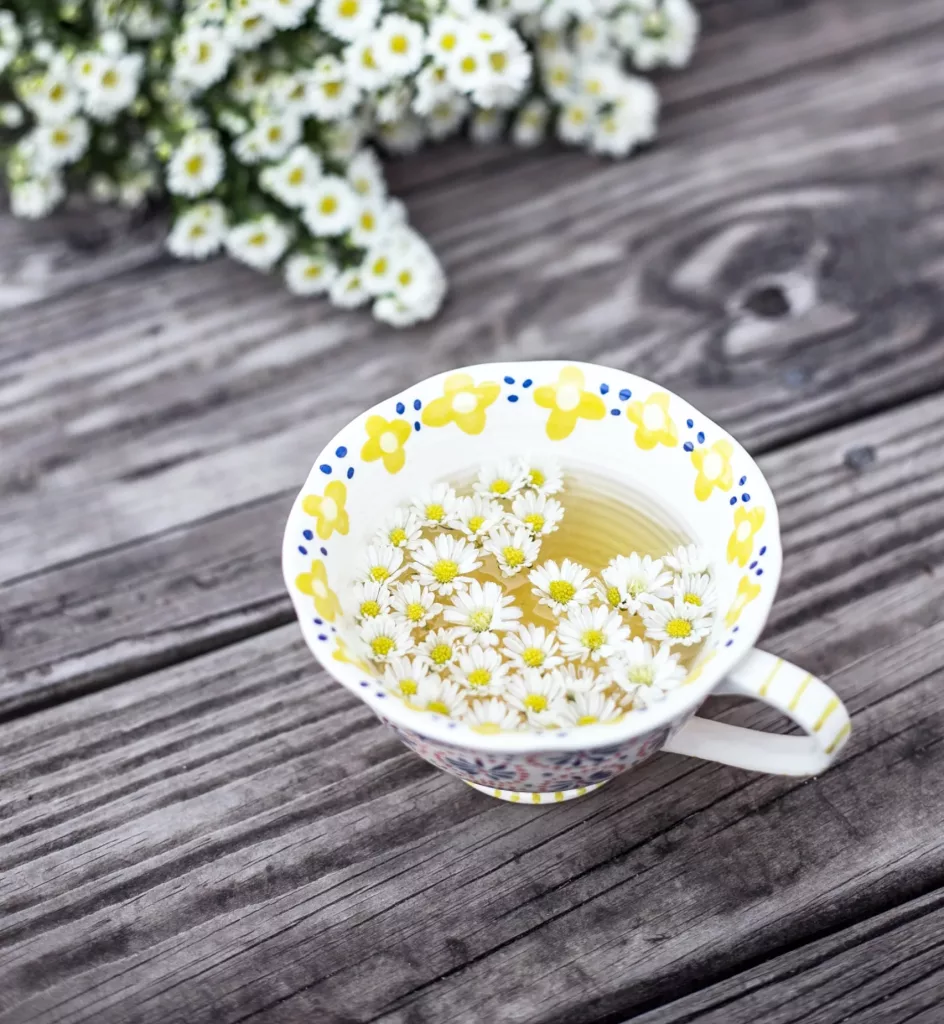Discover the Soothing Benefits of Chamomile Tea
Chamomile tea, a timeless herbal beverage known for its soothing qualities, has been cherished for centuries by cultures worldwide.
From promoting relaxation to aiding in digestive health, this golden elixir offers a plethora of benefits that make it a delightful addition to your daily routine.
In this blog post, we will explore the various reasons why drink chamomile tea for great wellness.
So, pour yourself a warm cup of this fragrant brew and discover the compelling reasons to drink chamomile tea.
Why Drink Chamomile Tea and Make it a Daily Habit?
1. Chamomile Tea’s Relaxation and Stress-Reduction Power
One of the most celebrated qualities of chamomile tea is its ability to promote relaxation and reduce stress. Its gentle, floral aroma has a calming effect on the mind, making it a popular choice for winding down after a long day.
The natural compounds in chamomile, such as apigenin, help to relax the nervous system and reduce anxiety, making it a wonderful bedtime beverage to ensure a peaceful night’s sleep.
2. Improved Sleep Quality
Chamomile tea is often touted as a natural sleep aid. Sipping on a cup of chamomile tea before bedtime can help ease insomnia and promote better sleep quality.
Its mild sedative properties can help you drift into a restful slumber, ensuring you wake up refreshed and rejuvenated.

3. Good For Digestive Health
Chamomile tea is an excellent choice for those looking to improve their digestive health. It can ease symptoms of indigestion, bloating, and stomach discomfort.
The anti-inflammatory properties of chamomile can help soothe an upset stomach, making it a go-to remedy for gastrointestinal woes.
4. Chamomile Is Rich in Antioxidants
Chamomile tea is a powerhouse of antioxidants, including flavonoids, which can help combat free radicals in the body.
Antioxidants play a crucial role in protecting your cells from damage and reducing the risk of chronic diseases. Drinking chamomile tea is a simple yet effective way to boost your overall health.
5. Skin Benefits
The benefits of chamomile aren’t limited to just sipping the tea. Topical applications of chamomile-infused products can help soothe skin irritations, reduce redness, and combat acne.
The anti-inflammatory and antimicrobial properties of chamomile make it a popular ingredient in skincare products.
6. Menstrual Pain Relief
For women experiencing menstrual cramps, chamomile tea can be a natural remedy. Its anti-spasmodic properties can help relax the uterine muscles, reducing the severity of menstrual cramps and providing much-needed relief during that time of the month.
7. Allergy Relief
Chamomile’s anti-inflammatory properties can also help alleviate allergy symptoms, such as hay fever. Drinking chamomile tea regularly may reduce congestion and discomfort associated with seasonal allergies.
Embrace Wellness with Chamomile Tea
Chamomile tea is not just a delightful beverage; it’s a natural remedy that offers a myriad of benefits for your overall well-being.
From stress relief and better sleep to digestive health and skin benefits, the soothing qualities of chamomile make it a valuable addition to your daily routine.
So, why not make a cup of chamomile tea a regular part of your life? Enjoy the gentle embrace of this herbal elixir and experience the numerous advantages it brings to your health and wellness.
Incorporating chamomile tea into your daily routine is an easy and enjoyable way to improve your physical and mental health.
Start sipping on this golden elixir today and relish the soothing benefits it has to offer. Your body and mind will thank you for it.
Frequently Asked Questions about Chamomile Tea
Is it okay to drink Chamomile Tea every day?
In general, chamomile tea is considered safe for most people when consumed in moderation.
Drinking chamomile tea every day can have several potential health benefits, such as promoting relaxation, aiding digestion, and providing antioxidants.
However, it’s essential to be mindful of potential allergies, especially if you are allergic to plants in the Asteraceae family, as chamomile is a member of this family.
It’s always a good idea to consult with a healthcare professional, especially if you have any pre-existing medical conditions or are taking medications.
Some people may experience allergic reactions or interactions with certain medications. Pregnant women should also exercise caution and consult with their healthcare provider before consuming chamomile tea regularly.
As with any herbal tea, moderation is key, and if you notice any adverse reactions or discomfort, it’s advisable to reduce or stop consumption and seek medical advice if needed.
What is the best time to drink chamomile tea?
Chamomile tea is often associated with relaxation and calming effects, so it’s commonly consumed in the evening before bedtime to promote better sleep.
The calming properties of chamomile can help soothe nerves and reduce stress, making it an excellent choice for a bedtime beverage.
However, there’s no strict rule about when you can or cannot drink chamomile tea. Some people find it beneficial to drink it during the day to help with stress or digestive issues.
If you’re looking for relaxation or relief from stress, drinking chamomile tea in the late afternoon or early evening might be suitable.
Ultimately, the best time to drink chamomile tea depends on your personal preferences and how your body responds to it.
If you’re unsure, you can start by having a cup in the evening to see how it affects you, and then adjust the timing based on your experience.
Disclaimer: The following information is provided solely for informational purposes and should not be considered professional advice or a substitute for professional consultation. While every effort has been made to ensure the accuracy and reliability of the information presented, we make no representations or warranties of any kind, express or implied, regarding the completeness, accuracy, reliability, suitability, or availability of the information provided. Any reliance you place on such details is strictly at your own risk.








